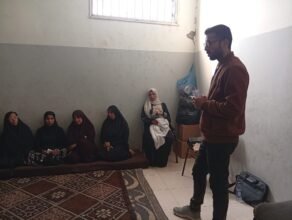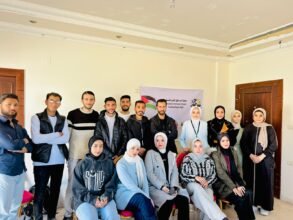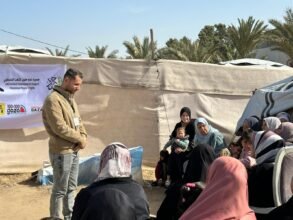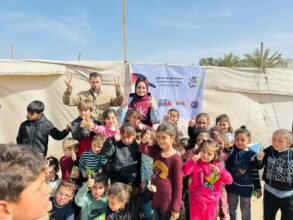
ICSPR Issues Policy Paper Titled From the Tents of the Nakba to the Tents of Gaza Palestinian Camps from 1948 to 2023
Date: May 14, 2025
Press Release
ICSPR Issues Policy Paper Titled: “From the Tents of the Nakba to the Tents of Gaza: Palestinian Camps from 1948 to 2023”
The International Commission to Support Palestinian Rights (ICSPR) has issued a policy paper entitled: “From the Tents of the Nakba to the Tents of Gaza: Palestinian Camps from 1948 to 2023”, prepared by attorney Reem Mahmoud Mansour. The paper aims to shed light on the historical, social, and political transformations that Palestinian refugee camps have undergone from the Nakba of 1948 to the ongoing Israeli war on the Gaza Strip since October 7, 2023.
The paper affirms that the Palestinian camps were not merely temporary shelters, but rather have become enduring symbols of forced displacement and attachment to national identity. They stand as evidence of an ongoing historical crime—the uprooting of the Palestinian people from their land. The Nakba is repeating today in an even more tragic form, through thousands of tents erected in southern Gaza, symbolizing a new wave of forced displacement under a false humanitarian pretext.
1. The Camp as a Product of the Nakba – Historical Context
The paper explains that Palestinian refugee camps emerged as an emergency response to the forced displacement of approximately 750,000 Palestinians in 1948. Under the supervision of UNRWA, these camps were established within Palestine and in host countries such as Lebanon, Syria, and Jordan, to provide minimal relief. Over time, however, the camps transformed into stable demographic, political, and social entities, becoming a source of strength for refugees and a testament to their adherence to the right of return.
2. Gaza’s Tents after October 7 – A Renewed Nakba
The paper notes that the ongoing Israeli aggression on Gaza since October 7, 2023, has led to the forced displacement of more than two million Palestinians under catastrophic humanitarian conditions lacking the most basic necessities. The tents now erected in Rafah, Khan Yunis, and other areas eerily replicate the scenes of the 1948 Nakba—but this time within a besieged land with crumbling infrastructure, under continuous threats of external forced displacement backed by U.S. support and international complicity.
3. Shared Suffering – Comparative Approaches
The paper outlines three comparative perspectives that highlight the shared suffering across the two Nakbas:
-
Forced displacement as a colonial tool: Used in 1948 to depopulate Palestinian villages in favor of settlements, and now used systematically in Gaza to conduct ethnic cleansing and demographic alteration.
-
Deteriorating living conditions: Displaced people today face circumstances similar to 1948, including overcrowding, lack of water and food, absence of healthcare, disease spread, and lack of privacy—amidst troubling global silence.
-
Framing the issue as merely humanitarian: The displacement crisis is being reduced to a humanitarian issue, without recognizing its political and legal roots, which threatens to institutionalize forced displacement and turn it into a permanent reality.
4. Legal Framework – Displacement as an International Crime
The paper emphasizes that the forced displacement of Palestinians constitutes a grave violation of the Fourth Geneva Convention, particularly Articles 49 and 147, and qualifies as a crime against humanity and part of the crime of genocide. It also asserts that the Israeli occupation bears legal responsibility for the protection of civilians, yet continues to pursue a systematic policy of forced displacement in Gaza amid a total absence of international protection and accountability mechanisms.
5. Current Humanitarian Challenges
The paper outlines a series of humanitarian challenges facing the population of Gaza today, most notably:
-
Shelter: Over 1.9 million displaced people are living in tents or shelters without protection from the weather or airstrikes.
-
Food and Water: There is a severe shortage of food and water due to the destruction of water infrastructure and the obstruction of aid entry, leading to famine, disease, and dehydration.
-
Healthcare: Gaza’s health system has completely collapsed, with a critical shortage of medicines and essential treatments.
-
Education: The educational process has come to a halt due to the destruction of schools or their conversion into shelters.
-
Poverty and Unemployment: Gaza is suffering from total economic paralysis and unprecedented levels of poverty.
-
Complete reliance on international aid, in the absence of any local economic or sovereign capabilities.
6. Proposed Policy Alternatives
The paper offers a set of policy recommendations and alternatives, including:
-
Achieving an immediate and sustainable ceasefire with international guarantees.
-
Lifting the blockade, opening border crossings and humanitarian corridors to allow the entry of aid, fuel, and medical supplies, and ensuring freedom of movement.
-
Providing international protection for Palestinian civilians and holding the occupying power accountable before international courts.
-
Supporting Palestinian national reconciliation efforts and unity in confronting genocide and displacement crimes.
-
Empowering citizens, strengthening their resilience, rejecting all resettlement or forced displacement projects, and upholding the right of return.
The paper concludes by stating that Gaza’s tents today clearly reflect the continuation of an unresolved Nakba, which is only worsening under ongoing Israeli colonial policies. It also exposes the failure of the international community to confront these policies, risking the normalization of forced displacement as a permanent reality and creating a new Nakba for Palestinians.
The International Commission “ICSPR” calls on the international community, all political forces, Palestinian and Arab grassroots movements, and freedom-loving people worldwide to act urgently to stop the genocide and Israeli aggression, ensure the flow of humanitarian aid, compel the occupation to comply with its legal obligations, support reconstruction efforts, provide international protection for the Palestinian people, hold the occupation accountable for its crimes, and end the culture of impunity, thus guaranteeing the return of the displaced and ending the colonial occupation.
To read the full paper, click here.





